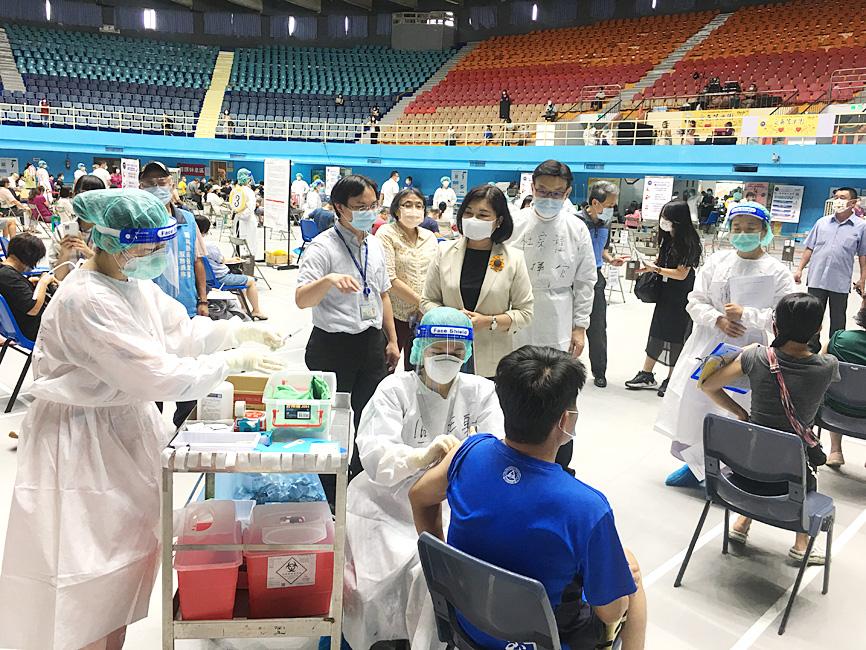The Advisory Committee on Immunization Practices (ACIP) yesterday agreed to a mix-and-match approach for COVID-19 vaccines, and approved the inclusion of Medigen Vaccine Biologics Corp’s (高端疫苗) COVID-19 vaccine in the national vaccination program.
Minister of Health and Welfare Chen Shih-chung (陳時中), who heads the Central Epidemic Command Center (CECC), said it was agreed at an ACIP meeting yesterday morning that a mix-and-match approach was acceptable for people receiving two doses of COVID-19 vaccines.
Most people in the first three COVID-19 vaccination priority groups have received a first dose of the AstraZeneca vaccine, Chen said.

Photo: Huang Shu-li, Taipei Times
Specialists in the committee said people in those groups should be allowed to receive a mRNA vaccine for their second dose, at least eight weeks after their first dose, he said.
However, to keep the vaccination policy consistent, the center would arrange for the second dose of the mix-and-match regimen to be administered 10 to 12 weeks after the first dose, he said.
Asked when the mix-and-match vaccination strategy would be implemented, Chen said that a date has not yet been set, as the ACIP’s decision was only reached at noon yesterday.
The CECC must still discuss plans for the strategy’s implementation, as well as modify the online vaccination booking system to allow for the mixing of doses, Chen said.
The ACIP also approved the domestic Medigen vaccine for inclusion in the national vaccination program, he said.
Regarding rollout of the Medigen vaccine, Chen said the CECC would need to meet with the vaccine maker to confirm its supply plan and schedule.
Medigen obtained Emergency Use Authorization for its vaccine from the Food and Drug Administration on Monday last week, the first local vaccine maker to do so.
The administration based its decision on data Medigen obtained in a phase 2 clinical trial involving about 4,000 participants earlier this year, which was analyzed using immunobridging and compared to a control group of 200 AstraZeneca vaccine recipients in Taoyuan.
Medigen has said it has permission to conduct a phase 3 clinical trial among 1,000 people in Paraguay.
Additional reporting by CNA

DAREDEVIL: Honnold said it had always been a dream of his to climb Taipei 101, while a Netflix producer said the skyscraper was ‘a real icon of this country’ US climber Alex Honnold yesterday took on Taiwan’s tallest building, becoming the first person to scale Taipei 101 without a rope, harness or safety net. Hundreds of spectators gathered at the base of the 101-story skyscraper to watch Honnold, 40, embark on his daredevil feat, which was also broadcast live on Netflix. Dressed in a red T-shirt and yellow custom-made climbing shoes, Honnold swiftly moved up the southeast face of the glass and steel building. At one point, he stepped onto a platform midway up to wave down at fans and onlookers who were taking photos. People watching from inside

A Vietnamese migrant worker yesterday won NT$12 million (US$379,627) on a Lunar New Year scratch card in Kaohsiung as part of Taiwan Lottery Co’s (台灣彩券) “NT$12 Million Grand Fortune” (1200萬大吉利) game. The man was the first top-prize winner of the new game launched on Jan. 6 to mark the Lunar New Year. Three Vietnamese migrant workers visited a Taiwan Lottery shop on Xinyue Street in Kaohsiung’s Gangshan District (崗山), a store representative said. The player bought multiple tickets and, after winning nothing, held the final lottery ticket in one hand and rubbed the store’s statue of the Maitreya Buddha’s belly with the other,

‘COMMITTED TO DETERRENCE’: Washington would stand by its allies, but it can only help as much as countries help themselves, Raymond Greene said The US is committed to deterrence in the first island chain, but it should not bear the burden alone, as “freedom is not free,” American Institute in Taiwan Director Raymond Greene said in a speech at the Institute for National Defense and Security Research’s “Strengthening Resilience: Defense as the Engine of Development” seminar in Taipei yesterday. In the speech, titled “Investing Together and a Secure and Prosperous Future,” Greene highlighted the contributions of US President Donald Trump’s administration to Taiwan’s defense efforts, including the establishment of supply chains for drones and autonomous systems, offers of security assistance and the expansion of

STREAMLINED: The dedicated funding would allow the US to transfer equipment to Taiwan when needed and order upgraded replacements for stockpiles, a source said The US House of Representatives on Thursday passed a defense appropriations bill totaling US$838.7 billion, of which US$1 billion is to be allocated to reinforcing security cooperation with Taiwan and US$150 million to replace defense articles provided to the nation. These are part of the Consolidated Appropriation Act, which the US House yesterday passed with 341 votes in favor and 88 against. The act must be passed by the US Senate before Friday next week to avoid another government shutdown. The US House Committee on Appropriations on Monday unveiled the act, saying that it allocates US$1 billion for the Taiwan Security Cooperation Initiative